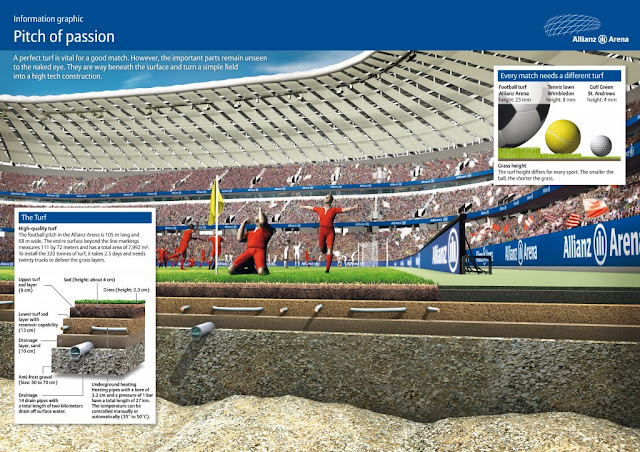The Allianz Arena
In this era, many buildings are built with a unique style, not just buildings such as houses or office buildings, but also the football stadium. one of which is the Allianz Arena.

Three years only after the foundation stone was laid, the Allianz Arena was officially inaugurated in May 2005. The project was financed equally by the Bavarian capital’s two soccer clubs, TSV 1860 München and FC Bayern München. The design is by architects Herzog & de Meuron of Basel, Switzerland. Architect Jacques Herzog has called soccer public opera on a grand scale. Surely that makes the Allianz Arena, which he and Pierre de Meuron designed for the city of Munich, a stage on which high drama unfolds. Its nickname, “Ring of Fire,” has an epic quality reminiscent of Wagner or Tolkien and, just like Alberich’s or Frodo’s ring, the stadium is so luminous, tactile, and enchanting, one can hardly resist reaching out to touch it.
From a distance, the building’s skin resembles blown glass, but up close, the arena reveals itself to be covered in plastic cushions made of ethylenetetrafluoroethylene (ETFE) foil a mere 0.2 millimeters thick, inflated by a constant stream of warm air. No two of the 2,784 diamond-shaped cushions are alike each fits in one spot and one spot only, a feat of mass customization made possible thanks to computer modeling and their installation required the talents of 35 mountain climbers.
The Allianz Arena has been the home of Munich clubs FC Bayern and TSV 1860 since 2005. Total capacity of the arena is 69,901, of which 13,500 standing places. At international matches this is reduced to 66,000 seats.
First plans for the development of a new stadium arose in 1997, and even though the city council of Munich preferred reconstructing the old Olympiastadion, they eventually agreed to the clubs’ proposal.
Construction of the Allianz Arena started in October 2002, with a total investment in the project of €340 million. First match at the stadium was played on the 30th of May 2005 between TSV 1860 and 1. FC Nürnberg (3-2). One day later Bayern played its first match at the stadium against the German national team (4-2).
Six matches were played at the stadium during the 2006 World Cup, among which the opening match between Germany and Costa Rica (4-2) and the semi-final between France and Portugal (1-0). In 2012 the Allianz Arena hosted the final of the Champions League between Chelsea and FC Bayern (1-1).
Allianz Arena – Seating
Allianz Arena – pitch
Allianz Arena – Way To The Pitch
References:
- Angelo Spampinato (Allianz Arena), http://www.worldstadiums.com/stadium_menu/architecture/stadium_design/munchen_allianz.shtml
- Tracy Metz (Herzog & de Meuron’s cushiony chameleon glows with rival teams’ colors), http://archrecord.construction.com/projects/bts/archives/stadiums/06_allianz/overview.asp
- Official Site Bayern Munich (The Allianz Arena), http://www.fcbayern.telekom.de/en/company/company/allianz/index.php
CHANDRAKA SUKMA ANUTAMA
1106127935
.jpg)







I am amazed with the lighting of the stadium. It gives more life into the stadium as ti illuminates at night. I wonder how much the technology costs for the lighting of the stadium...
ReplyDeleteSatria Rahmadi D.
1106024142
The electricity cost for the light of about 50 Euros or 75 USD per hour.
DeleteChandraka Sukma Anutama
1106127935
Hai chandra, it's interesting that you post about a football stadium because as we know that in several days, one of the biggest football event in Europe will be held.
ReplyDeleteSo it will also be interesting if you discuss about the stadium that will be used in the Euro Cup event, is it green as well?
Rifda Marwa Ufaira
1106847092